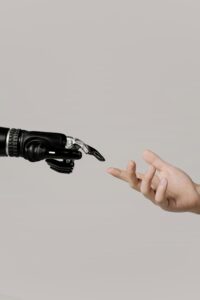The fast pace of the modern world has seen healthcare develop at lightspeed. One of the most thrilling developments is the emergence of Artificial Intelligence (AI) in medicine. Rather than sending doctors out of business, AI is becoming their strongest support, assisting them to diagnose quicker, treat more effectively, and provide brighter care to patients.
AI in Diagnosis: A Second Pair of Eyes
One of the most daunting and time-consuming activities for physicians is making correct diagnoses. Misdiagnosis can prove fatal, yet with AI, physicians now have a “second pair of eyes.”
Medical Imaging: AI tools can interpret X-rays, MRIs, and CT scans more rapidly and in some cases more effectively than a human could. For instance, AI systems can identify at an early stage signs of lung cancer or breast cancer that even a seasoned professional might overlook.
Pathology: Machine learning algorithms assist pathologists in detecting disease markers in tissue samples at unprecedented speed.
By minimizing human error, AI ensures physicians make better and quicker decisions.
AI in Patient Monitoring: Predict Before It Happens
AI doesn’t stop at diagnosis—it assists in ongoing patient monitoring.
Wearable Devices: Smart watches and health trackers today track heart rate, blood pressure, oxygen, and even sleeping patterns. These wearables, linked with AI algorithms, notify physicians of abnormalities before they turn into life-threatening conditions.
Predictive Analytics: Based on patient history and real-time data, AI can forecast chronic condition risks such as diabetes, heart attack, or stroke. Physicians can act early to avert complications.
AI in Drug Discovery: Speedier Medicines for Patients
It used to take 10–15 years traditionally to develop a new drug. AI is shortening it by leaps and bounds.
Speed: With millions of chemical reactions being simulated, AI foretells which molecules will perform best against an illness.
Cost-Effective: This cuts down billions of dollars in research expenses and delivers life-saving medicine to patients sooner.
Personalized Treatment: AI assists in developing drugs specific to individual genetic profiles, enhancing success rates.
Benefits for Doctors: Reducing the Burden
Physicians frequently suffer from burnout as a result of extended work hours and incapacitating data.
AI assists by:
*Automating office work (reports, patient records, prescriptions).
*Offering clinical decision support (recommending optimal treatment choices).
*Assisting in surgery through AI-enabled robotic assistance that enhances accuracy.
*This enables physicians to spend more time with patients and less on paperwork.
Obstacles of AI in Healthcare
Even with its potential, AI isn’t without its flaws. Some of the obstacles are:
*Data Privacy: Patient information should be safe from abuse.
*Ethical Issues: Ought AI to decide critical healthcare choices?
*Dependence: Physicians need to make AI assist—not supplant—their decision-making.
The Future: Physicians + AI = Intelligent Medicine
The future is not about replacing physicians with AI—it’s about empowering physicians with AI. Think about a world where AI watches over patients 24/7, anticipates health threats, aids in tailoring treatments, and assists physicians with the finest medical expertise at once.
That future is here already, and it’s only getting smarter.
In brief: AI isn’t replacing doctors—it’s making them smarter, faster, and more efficient, so patients everywhere can get the best care possible.